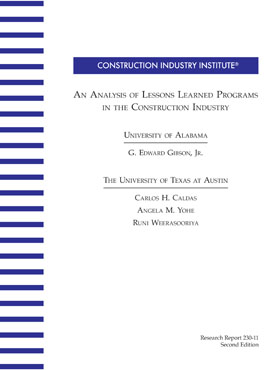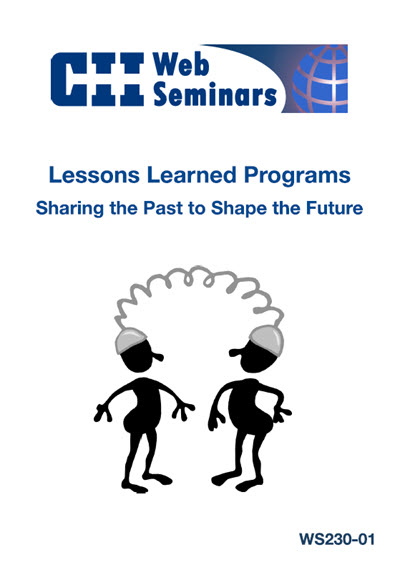
An Analysis of Lessons Learned Programs in the Construction Industry, Second Edition
Publication No
RR230-11
Type
Academic Document
Publication Date
Nov 01, 2007
Pages
251
Research Team
RT-230
DOCUMENT DETAILS
Abstract
Filters & Tags
Abstract
Effectiveness in the construction industry depends to a large extent on organizations’ ability to store and transmit knowledge and experience. Lessons learned programs are used to capture and disseminate knowledge to add value and continuously improve an organization.
This study analyzes lessons learned programs in the construction industry by conducting multiple surveys and interview sessions. Its major findings were as follows:
- Lessons learned programs are widely used by many construction organizations.
- Organizations must understand the key characteristics of a lessons learned program, which include leadership, lesson collection, lesson analysis, lesson implementation, resources, maintenance and improvement, and culture.
- They must also recognize some special considerations that include legal issues, challenges with metrics, cultural and global concerns, and implementation hurdles in order to implement an effective lessons learned program.
- Both human and IT resources are critical to lessons learned program success.
Guidance for all of these areas are provided in this report based on an extensive research effort involving more than 100 individuals from 70 organizations.
Filters & Tags
Knowledge Area
Best Practice
Project Phase
Project Function
Industry Group
Research Topic
Effective Management Practices and Technologies for Lessons Learned Programs
Keywords
Lessons Learned,
Lessons Learned Program,
Knowledge,
Knowledge Management,
Knowledge Management System,
Post-Project Reviews,
Project Post-Mortem,
Post-Project Appraisals,
Corporate Feedback Cycle,
Transactional Work Flow Diagram,
Jump Start Guide,
Maturity Matrix Model,
rt230



